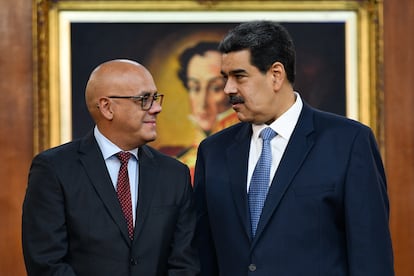Venezuela criticizes return of US sanctions and claims it did not pledge to let opposition leader run in election
The government apparatus deploys a propaganda operation to counter the effects of Biden’s decision, showcasing good economic forecasts and new agreements with the oil company Repsol

Jorge Rodríguez, the head of the Venezuelan government delegation that signed the Barbados agreements lifting U.S. sanctions in exchange for steps towards fair elections, on Wednesday criticized the U.S. announcement that it is reimposing sanctions. Rodríguez, who is the right-hand man to President Nicolás Maduro, accused the American government of “failing its word” regarding the agreements. Flanked by other leaders of the United Socialist Party of Venezuela (PSUV), Rodríguez delivered a detailed account of the most relevant milestones of the Venezuelan government’s political dialogue with both the United States and the local opposition.
In October, the U.S. granted Maduro’s government relief from sanctions on its state-run oil, gas and mining sectors after it agreed to work with members of the opposition to hold a free and competitive presidential election this year. Instead, the government has consistently hindered efforts by opposition leaders to register as candidates in the election scheduled for July 28.
Rodríguez insisted that the Maduro administration “had never committed to allowing those who violated the constitution and called for violence to participate in these elections,” alluding to main opposition leader María Corina Machado, who was banned from registering as a candidate, as was her designated alternative. Rodríguez claimed that the ruling party “has kept its word regarding the electoral calendar, international observers and voting guarantees.” He added that Venezuela recently received a mission from the European Union, “as we have always done, and unlike the United States, which does not allow international observation in its elections.”
In his speech, Rodríguez made several reflections on political decency and the moral implications of giving one’s word, alluding to U.S. officials. His only references to opposition politicians was for the purpose of disqualifying them. “I would be ashamed to have signed this agreement and then deny it in this way,” he said. As on other occasions, Rodríguez asked “the Venezuelan people” to “raise their voice” against the sanctions “and coercive measures” requested by the U.S. government.
While Rodríguez publicly discussed the predictable bad news from the Biden administration, the official propaganda apparatus was busy deploying a vigorous campaign to present its own version of events with trending hashtags on social media, such as #BidenLevantaElBloqueoYa (BidenLiftTheBlockadeNow). Billboards were displayed blaming the opposition for the social and economic tragedy of these last years.
Once Rodríguez’s speech was over, President Maduro himself went on the air to provide commentary on an agricultural fair and remark repeatedly on the reactivation of the economy. “The International Monetary Fund, which does not like us (neither do we them), is projecting economic growth of 4 points of GDP for Venezuela this year,” said Maduro, whose government spent years without publishing formal economic figures as it denied the existence of a crisis. This occurred in the most serious moments of the contraction, hyperinflation and shortages that shaped the historic Venezuelan economic crash between 2013 and 2019.
In the midst of the efforts to offer a vigorous image of the Venezuelan economy, the president of the state-owned oil company Petróleos de Venezuela (PDVSA), Pedro Tellechea, called international reporters to an event in which the Spanish oil company Repsol reiterated its investment commitments in the country, including the latest agreements in the Quiriquire oil fields and gas investments.
From its traditional 3,000,000 barrels a day, Venezuela began a slow productive decline starting in 2005, at the height of the effervescence of Chavismo, the movement that follows the precepts of former president Hugo Chávez. Aggravated by politicization, disinvestment and rampant corruption, and with the final blow of international sanctions, national oil production plummeted to 300,000 barrels a day in 2021. The licenses and partial agreements of some companies with PDVSA, along with Tellechea’s efforts, have recovered production to the current level of 890,000 barrels a day.
Seeking to allay concerns following the reintroduction of sanctions, Tellechea reiterated that the country remains open to discussing agreements with other global oil companies that would like to invest in Venezuelan fields. “I don’t think these measures are going to generate anything. With the 44th license, companies interested in working with us will be able to request their license individually.”
Sign up for our weekly newsletter to get more English-language news coverage from EL PAÍS USA Edition
Tu suscripción se está usando en otro dispositivo
¿Quieres añadir otro usuario a tu suscripción?
Si continúas leyendo en este dispositivo, no se podrá leer en el otro.
FlechaTu suscripción se está usando en otro dispositivo y solo puedes acceder a EL PAÍS desde un dispositivo a la vez.
Si quieres compartir tu cuenta, cambia tu suscripción a la modalidad Premium, así podrás añadir otro usuario. Cada uno accederá con su propia cuenta de email, lo que os permitirá personalizar vuestra experiencia en EL PAÍS.
¿Tienes una suscripción de empresa? Accede aquí para contratar más cuentas.
En el caso de no saber quién está usando tu cuenta, te recomendamos cambiar tu contraseña aquí.
Si decides continuar compartiendo tu cuenta, este mensaje se mostrará en tu dispositivo y en el de la otra persona que está usando tu cuenta de forma indefinida, afectando a tu experiencia de lectura. Puedes consultar aquí los términos y condiciones de la suscripción digital.








































